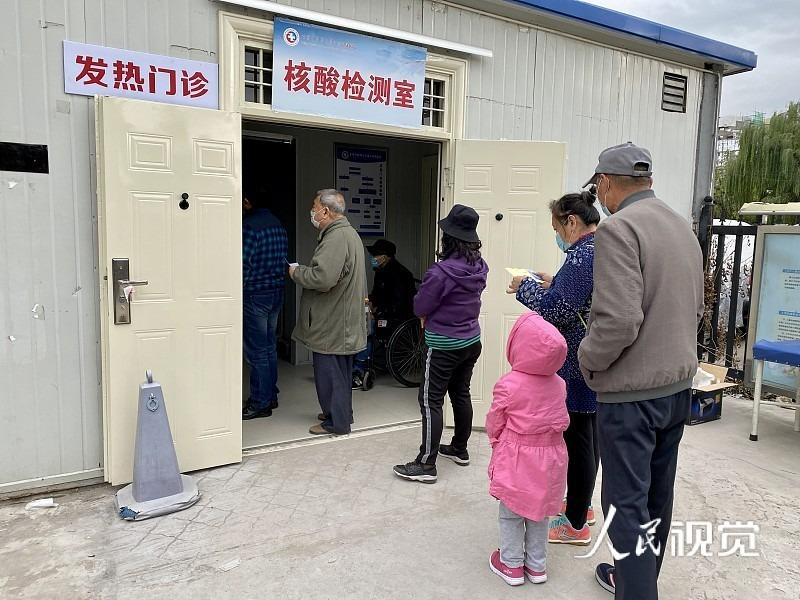 A fever clinic is seen receiving patients in Beijing. (PHOTO / PEOPLE.CN )
A fever clinic is seen receiving patients in Beijing. (PHOTO / PEOPLE.CN )
Beijing has been building fever clinics in neighborhood health service centers citywide to further strengthen COVID-19 control and prevention, as such clinics have proved effective in detecting new cases.
The Desheng Community Health Service Center, located in Xicheng district, recently opened its own temporary treatment clinic to handle patients with fever.
The Desheng Community Health Service Center, located in Xicheng district, recently opened its own temporary treatment clinic to handle patients with fever
In an area of only 6 square meters, the clinic has functions similar to those in a hospital's fever department, which might be as large as 80 square meters.
Zhang Hongxing, a Desheng resident, said the neighborhood health centers previously would not evaluate or treat fever patients, which was inconvenient for residents.
"Now, we don't have to wait in a long line at a big, crowded hospital just to get a fever checked," he said. "That's especially so when it comes to children. I don't want to bring my 6-year-old son with a fever to a large hospital because of the risk of cross-infection. The clinic has made it easier for patients and eased the pressure on large hospitals."
READ MORE: Fever clinics prepare amid scattered COVID-19 cases
The clinic is divided into two parts. Doctors are isolated from patients by a transparent acrylic window, but can communicate and evaluate patients using microphones and other technology. Measures are in place for doctors to take samples for nucleic acid testing. Doctors have access to videophones to call an ambulance if necessary and a computer to help with diagnoses.
Doctors can disinfect the patient space via remote control equipment after a patient leaves.
According to the Beijing Health Commission, the city had completed fever clinics at 234 neighborhood health centers by Nov 30, and plans call for authorities to build more such clinics.
According to the Beijing Health Commission, the city had completed fever clinics at 234 neighborhood health centers by Nov 30
Moreover, large hospitals are urged to accelerate the construction or upgrading of their fever departments to conduct prescreening of fever patients, Gao Xiaojun, a spokesman for the commission, said last week.
By the end of November, 33 such hospitals had upgraded or expanded their fever departments, which gave Beijing 101 hospital fever departments.
Since February, the city government has asked large hospitals to upgrade or build new fever departments because such departments were where virtually all early COVID-19 cases were detected in many parts of the country.
Beijing Anzhen Hospital, in Chaoyang district, was the city's first hospital to open a new fever department to patients, The Beijing News reported.
The new fever departments also are now able to isolate patients to keep infections from spreading within hospitals or beyond. Inpatient isolation wards and testing facilities are integrated into the new departments.
Such moves are meant to reduce the infection risks and raise efficiency, officials said.
ALSO READ: Virtual clinics being set up to help tackle contagion
By 2022, Beijing will increase the number of its negative pressure wards to 700. Such wards maintain air pressure at a lower level than in surrounding areas, which keeps potential means of infection, such as aerosols, from escaping from the ward. That covers key major hospitals for infectious diseases, comprehensive hospitals and district-level hospitals, according to the city's three-year (2020-22) plan for public health emergency management, which was released in June.
Wuhan, Hubei province, has built 62 designated fever departments in hospitals and 203 fever clinics in neighborhood medical centers, which has created a network that enables patients with a fever to access evaluation and treatment within 12 minutes of their homes, according to Changjiang Daily.
A network like that can increase the capacity of a city to detect emerging outbreaks swiftly, which is crucial for timely epidemic detection and control, said Wei Sheng, a professor at the School of Public Health of Huazhong University of Science and Technology's Tongji Medical College.


